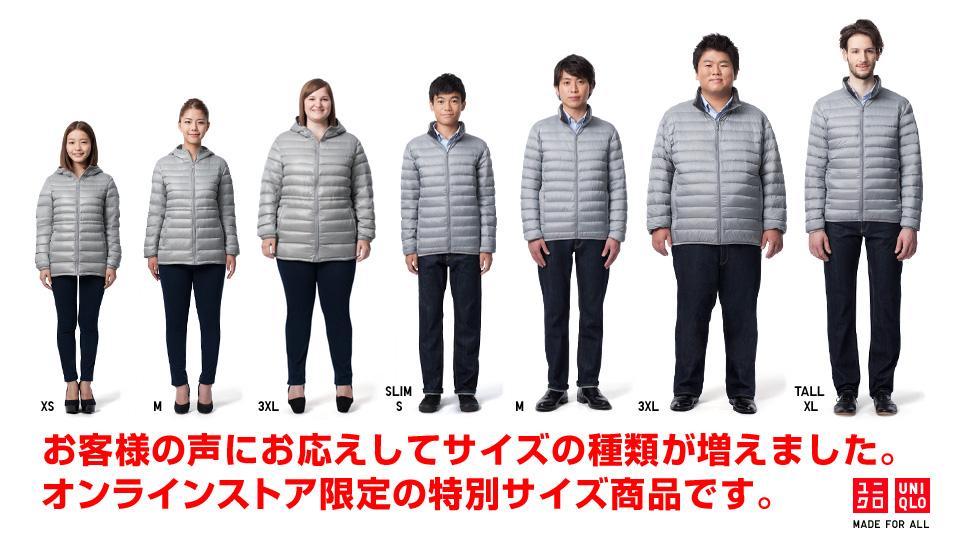An ad for Uniqlo, the Japanese clothing store that’s occasionally referred to as the Japanese GAP.
I’m a 30-year-old Asian-American woman who's 4-foot-10 — and my size is not that unusual for someone of my background. But here in America, off-the-rack clothes just do not fit.
Pants are super baggy and necklines plunge down to my ribs, so I often wind up wearing children’s clothes. But this comes with its own problems: Skirts and pants have elastic waistbands that bunch at my stomach; shirts and dresses are designed for the flat-chested, which I am not. And don’t even get me started on the bows and frills.
When it comes to clothes, America is telling me I’m not a girl, but not a woman. So I was really excited to hear that Uniqlo is coming to town.
Uniqlo is a clothing chain from Japan often described as a Japanese version of the GAP. It’s been around for a few years in New Jersey, New York and San Francisco. But this fall they’re kicking off a big US expansion that includes my hometown of Boston.
Their clothes are simple and basic, but the part that matters to me is their sizing: It consistently runs small.
I showed up at their Boston pop-up store on a hot summer afternoon. When I explained my sizing issues to Rachel Erani, a sales associate, she knew exactly what I was talking about.
“Yeah, our clothing is made for everyone, but we especially accommodate to small people,” she said. “Our sizing is actually a little bit small, because our clothing originated in Japan.”
Rachel was standing next to a wall of tank tops, which she totally recommended: “We have these Airism tops that fit everyone nicely. They stretch really well, they are odor proof, and they are dry fit, super light, and they do run a size smaller than most American sizing. But you’d probably be an extra small (XS) or a small in these.”
In a typical store, XS is large on me. But at Uniqlo, it was the small that fit. $20 for a shirt that was flattering AND odor proof? I was sold.
Outside the store, I ran into Kazuka Kuwahara. She looked about my size, so I asked her where she shops. “I shop at Anthropologie, but to be honest, their clothes don’t fit me.”
So where did she get her cute summer dress? “I bought this from TJ Maxx, and it kind of fits me,” she said.
That’s how I feel about most of my clothes, and it’s not just me. There are a lot of people in this country who don’t fit American sizes, so having a place like Uniqlo in our neighborhood is a big deal.
But the rest of America might rain on our parade: It turns out that Uniqlo has gotten some complaints since opening in the US.
One Internet reviewer said he was “tortured by the sizing.” His hooded sweatshirt fit “like a sausage casing.” The fashion blog, Racked, quipped that Uniqlo was starting to realize that, “unlike the … Japanese, American women are not paper dolls.”
And Uniqlo’s US operations aren’t doing so well. They have more than 25 stores on both coasts and they’recollectively losing money for the company. One of their biggest challenges in breaking into the US mainstream market is sizing.
Yuya Tanahashi, Uniqlo’s Boston area manager, calls it an ongoing struggle for the brand. “We are actually analyzing every year about the fit,” he says.
Basically, they’re checking sales data in each of their stores around the world, including here in Boston. “We’re going to try to find the best fit for the Boston customers as well by analyzing what items sell and what sizes sell,” Tanahashi says.
Uniqlo is looking into changing the sizes they offer in the US. In their words, they’re figuring out how to provide “a more ‘3D’ fit” for American shoppers.
So all those glorious form-flattering Smalls in the Boston store? They may not be small for long. But Tanahashi did offer me this: “We have kids line as well, and many adults actually purchase [clothes from the] kids line, meaning the boys and the girls style. So I would try to recommend the girls style as well.”
Kid section? Again? Ugh.
Do you struggle to find clothes that fit? Where do you shop, and how has that changed? Tell us in the comments below.
Our coverage reaches millions each week, but only a small fraction of listeners contribute to sustain our program. We still need 224 more people to donate $100 or $10/monthly to unlock our $67,000 match. Will you help us get there today?
